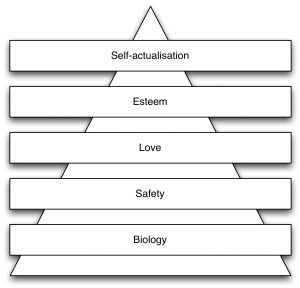Satisfaction
I’m increasingly interested in what makes people happy. It’s pretty clear that it’s not material things such as money or possessions. Similarly, purely selfish behaviour doesn’t seem to lead to contentment either. When we are considering what we want to with our life it is crucial to keep this simple goal and these considerations in mind.
As I spoke to students last week about personal visions, I revisited Maslow’s Hierarchy of Needs. I thought it might be valuable to repeat his thinking here.
Maslow’s hierarchy describes increasing levels of “self actualisation”. This is a state where people reach their full potential and feel fulfilled. In ascending order, the levels are:
- Biology (food, drink, shelter, warmth, sleep, sex)
- Safety (protection, stability, law & order)
- Love (family, affection, relationships)
- Esteem (achievement, status, responsibility, reputation)
- Self-actualisation (personal growth & fulfilment)
Recent research has confirmed that these are global requirements for satisfaction, although different cultures put priority differently. Still, it’s an interesting list and useful for establishing where we sit in our assessment of personal satisfaction.
What’s particularly impressive about Maslow is that he didn’t just leave the hierarchy is purely theoretical, he suggests the 15 characteristics most commonly associated with people who have attained self-actualisation.
The characteristics are:
- They perceive reality efficiently and can tolerate uncertainty
- Accept themselves and others for what they are
- Spontaneous in thought and action
- Problem-centred (although I prefer to think of it as “solutions-focussed”)
- Unusual sense of humour
- Able to look at life objectively
- Highly creative
- Resistant to enculturation
- Concerned for the welfare of mankind
- Capable of deep appreciation of basic life experiences
- Establish deep satisfying relationships with a few people
- Peak experiences
- Need for privacy
- Democratic attitudes
- Strong moral/ ethical standards
- Experience life like a child
- Try new things
- Listen to your own feelings
- Be honest
- Be prepared to be unpopular
- Take responsibility
- Work hard

